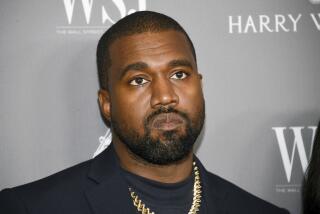Gripping essay ‘Tooth and Nail’ explores our obsession with our teeth
- Share via
There are, I must admit, a lot of resonances for me in Gina Williams’ essay “Tooth and Nail,” up at Okey-Panky this week. Not because Williams and I have so much in common — our experiences are very different — but because teeth have long been a particular obsession of mine.
I have bad teeth, cavity-prone and unreliable; just a day or two before I read “Tooth and Nail,” in fact, I cracked a molar and lost a crown. My entire adult life, I have rarely known a mouth intact, have chewed on one side of my jaw or the other, making allowances, always making allowances, for those failings, that neglect.
In “Tooth and Nail,” Williams tells the story not of her own teeth so much — although she does include one harrowing recollection from the 1970s: “My babysitter, Linda Crookshank, got high and triple-dog-dared me to yank out my two front teeth. The trouble was, they weren’t even loose. ‘If they come out early, you get triple the cash from the tooth fairy,’ she said. I can still see my blood spattering on the mirrored counter in my grandmother’s bathroom as I knocked those teeth out of my head.”
SIGN UP for the free Essential Arts & Culture newsletter >>
More to the point, she traces a journey, idiosyncratic and fragmentary, through the world of teeth. It begins with George Washington, who had “only one natural tooth remaining” when he was inaugurated as president, and includes reflections on dentures (her grandfather’s and great-grandmother’s), mouth-to mouth resuscitation (on a newborn lamb and also on an elder relative with extreme halitosis) as well as a deft consideration of the phrase “tooth and nail.”
Most evocative, perhaps, is her recollection of a visit to the dentist because of jaw pain. Initially, she worries that it may be a side effect of “a shameless foray into the world of BDSM.” Instead, she tells us, “A week later, I felt something sharp with my tongue. I fished around with my fingers and pulled a thin piece of bone from my gum, apparently dislodged and left there following the surgery. With that sliver gone, the pain vanished, and with it, a part of myself.”
Although I haven’t had exactly that experience, I know what she means. A couple of years ago, after I had two molars pulled, I departed the periodontist’s office feeling as if I’d left a piece of my body behind. The sensation was so visceral as to be animal, an expression of death, inevitable decay of the body, but worse because I’d helped hasten it along. Those teeth — one of them was also wisdom tooth — had to be extracted, but they also left deep roots of loss.
What does it mean to have a body? I wonder about this all the time. What does it mean to be contained in this fragile vessel, which we ignore or neglect at our own peril, not only in terms of serious illness but also daily indignity? That is how I often think about my teeth — in terms of discomfort, not physical so much as emotional, even spiritual. They are a constant reminder of the wear and tear of living, the uneasy ways in which I, like all of us, am breaking down.
“I know a poet who published an entire collection about his teeth,” Williams confides. “Each tooth has its own poem, and then some.” The idea is intriguing; I too have wanted to write about my teeth for some time.
But how to begin? The answer, I suppose, is with ourselves. Or, as she continues: “I don’t have enough teeth for that. A bunch of mine were yanked to make room for braces, for my pretty smile.”
Twitter: @davidulin
More to Read
Sign up for our Book Club newsletter
Get the latest news, events and more from the Los Angeles Times Book Club, and help us get L.A. reading and talking.
You may occasionally receive promotional content from the Los Angeles Times.









